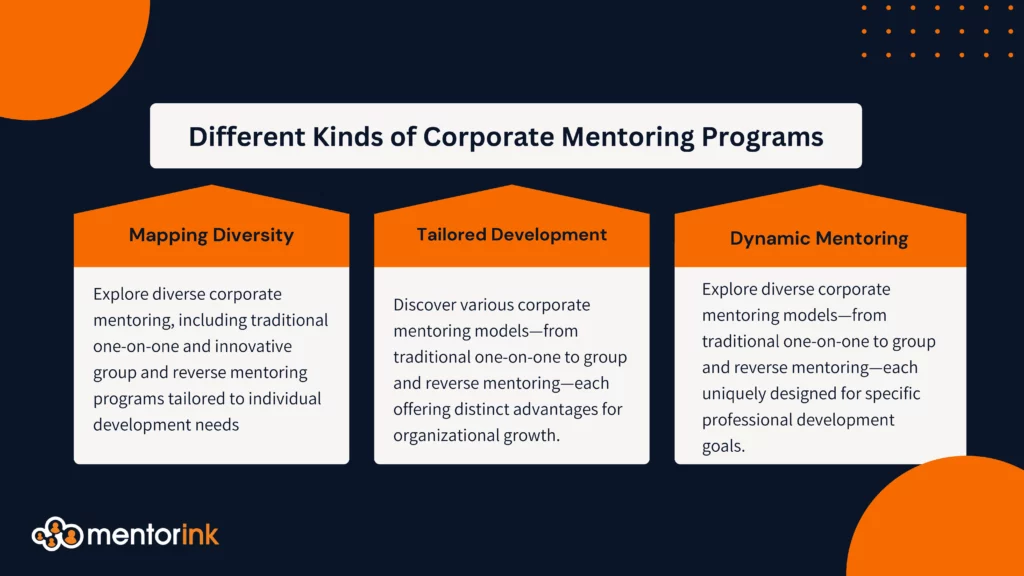
In today’s workforce, mentoring is an essential element for the development of talent. A mentor can help to accelerate someone’s career. A Mentor gives them a sense of what they need to do in order to reach their goals. Many companies invest in mentoring programs in order to contribute to the personal and professional growth of their employees and benefit from the positive outcomes of these programs. There are different types of corporate mentoring programs. This article will cover each one of these. Then they can be implemented in the workplaces. Employees may expect the context of the programs. They know exactly why they are participating to them and what they should expect from them.
Types of Mentoring Programs:
1. Leadership Development
With the changing dynamics of business, it is more important than ever to ensure that you have a workforce ready for the future. Leadership development mentoring programs are designed to help develop employees into leaders who can make decisions and deal with conflict in both professional and personal settings. These leadership development programs are offered by companies and organizations in order to provide their employees with access to experts in the field as well as an opportunity to network. As the world changes, and more employees are entering leadership roles, it is important to have mentors who can prepare them for this new challenge. Mentors help them to be equipped with the knowledge, skills, and experience they need to become a good leader. Through leadership development mentorship programs, the organizations seek to build leaders and leaders of tomorrow.
2. Succession Planning
Mentoring programs on succession planning create a positive, productive climate conducive to career success. They are essential to the success of an organization. They allow for a smooth transition of roles in an environment that fosters trust and high morale. All companies and organizations should have a strategy for continuous succession planning so that the roles can be filled easily and their operations are not disrupted. With a similar concept as leadership development, mentoring is a great way to prepare employees for potential succession.
3. Onboarding
Onboarding mentorship programs have become increasingly popular in the past few years and they are designed to help the new employee adapt to the new workplace and feel more comfortable with the company and its culture. In these programs, mentors help new employees learn how to behave in the workplace in various ways, including role-playing and observation beside supporting them to improve the most critical skills needed in their new role.
4. Transition Mentoring
The aim of transition mentoring is to assist employees adapt to new conditions, processes and procedures easily. It is effectively applicable for ensuring employees’ adaptation to sudden changes like new working conditions employees have faced with in pandemic in early 2020. Generally, group mentoring is preferrable in transition mentoring and it helps arise connection, empathy and collaboration among employees resulting in a positive work culture.
5. Upskilling
Unlike succession planning mentoring, upskilling mentoring is designed to retain existing employees. With this type of mentoring, companies aim to give chances to employees to progress in their role. Upskilling mentoring occurs when a mentor helps a person learn the skills needed in their role to do their job well. This is a keystone in becoming an expert in a field of practice. Mentors are the driving force of upskilling and help mentees to develop and build their skills, competencies, and expertise. Mentors give the right kind of attention, provide the correct guidance and support. Their mentees become more equipped and successful in their career.
6. Supporting Diversity and Inclusion
Diversity is critical to the success of any organization, and the ability to build a diverse mentoring network helps create a more inclusive workplace. When companies adopt mentoring programs for supporting diversity and inclusion, it ensures employees gain a new perspective and understanding of problems and challenges under-represented people face daily. Diversity and inclusivity mentoring programs provide support for all employees from any gender, race, religion and cultural background. They focus on overcoming inequality among employees.
Conclusion
Now, you know different types of corporate mentoring programs. It is the right time to promote a mentoring program in your organization. Mentorink can empower your organization in many ways. It is a flexible and cost-effective online smart mentoring platform so that mentoring can be democratized in workplaces and available to all employees from day zero.
Let us help you kick start your project!
Cheers!


